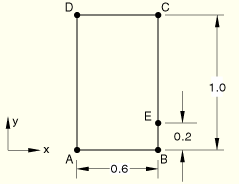
Products: ABAQUS/Standard ABAQUS/Explicit
DC2D3 DC2D4 DC2D6 DC2D8
DC3D4 DC3D6 DC3D8 DC3D10 DC3D15 DC3D20


The two-dimensional geometry is shown above. Three-dimensional elements are tested with a thickness of 1.0 in the ![]() -direction. In ABAQUS/Standard a steady-state simulation is performed, while in ABAQUS/Explicit a transient simulation is performed. The total simulation time in the latter case is 20000 seconds, which provides enough time for the transient solution to reach steady-state conditions in this problem.
-direction. In ABAQUS/Standard a steady-state simulation is performed, while in ABAQUS/Explicit a transient simulation is performed. The total simulation time in the latter case is 20000 seconds, which provides enough time for the transient solution to reach steady-state conditions in this problem.
Conductivity = 52 W/m°C, surface convective coefficient = 750 W/m2/° C.
For coupled temperature-displacement elements dummy mechanical properties are used to complete the material definition.
Boundary conditions:
Temperature = 100° C along edge AB. Zero heat flux along edge DA. Convection to ambient temperature of 0° C along edges BC and CD.
Loading:
Zero internal heat generation.
This is a test recommended by the National Agency for Finite Element Methods and Standards (U.K.): Test T4 from NAFEMS publication TNSB, Rev. 3, “The Standard NAFEMS Benchmarks,” October 1990.
Target solution: Temperature of 18.3° C at point E.
The results for the ABAQUS/Standard analysis are shown in the following table. The values enclosed in parentheses are percentage differences with respect to the reference solution.
| Element | T, Coarse Mesh | T, Fine Mesh |
|---|---|---|
| DC2D3 | 22.40° C (22.4%) | 19.22° C (5.0%) |
| DC2D4 | 19.34° C (5.7%) | 18.91° C (3.3%) |
| DC2D6 | 17.99° C (–1.7%) | |
| DC2D8 | 17.90° C (–2.2%) | |
| DC3D4 | 18.81° C (2.8%) | |
| DC3D8 | 19.34° C (5.7%) | 18.91° C (3.3%) |
| DC3D6 | 22.40° C (22.4%) | 18.94° C (3.5%) |
| DC3D10 | 19.00° C (3.8%) | |
| DC3D15 | 17.99° C (–1.7%) | |
| DC3D20 | 17.90° C (–2.2%) | |
| CPE4RT | 19.34° C (5.7%) | 18.91° C (3.3%) |
| CPE4RHT | 19.34° C (5.7%) | 18.91° C (3.3%) |
| CPE6MT | 17.22° C (5.8%) | |
| CPE6MHT | 17.22° C (5.8%) | |
| CPS4RT | 19.34° C (5.7%) | 18.91° C (3.3%) |
| CPS6MT | 17.22° C (5.8%) | |
| C3D8T | 19.34° C (5.7%) | 18.91° C (3.3%) |
| C3D8RT | 19.34° C (5.7%) | 18.91° C (3.3%) |
| C3D8RHT | 19.34° C (5.7%) | 18.91° C (3.3%) |
| C3D10MT | 21.51°C (17.5%) | |
| C3D10MHT | 21.51°C (17.5%) |
The results for the ABAQUS/Explicit analysis are shown in the following table. The values enclosed in parentheses are percentage differences with respect to the reference solution.
DC2D3 elements.
DC2D4 elements.
DC2D6 elements.
DC2D8 elements.
DC3D4 elements.
DC3D6 elements.
DC3D8 elements.
DC3D10 elements.
DC3D15 elements.
DC3D20 elements.
CPE4RT elements.
CPE4RHT elements.
CPE6MT elements.
CPE6MHT elements.
CPS4RT elements.
CPS6MT elements.
C3D8T elements.
C3D8RT elements.
C3D8RHT elements.
C3D10MT elements.
C3D10MHT elements.
DC2D3 elements.
DC2D4 elements.
DC3D6 elements.
DC3D8 elements.
CPE4RT elements.
CPE4RHT elements.
CPS4RT elements.
C3D8T elements.
C3D8RT elements.
C3D8RHT elements.
CPE3T elements.
CPE4RT elements.
CPS3T elements.
CPS4RT elements.
C3D4T elements.
C3D6T elements.
C3D8RT elements.
CPE3T elements.
CPE4RT elements.
CPS3T elements.
CPS4RT elements.
C3D6T elements.
C3D8RT elements.